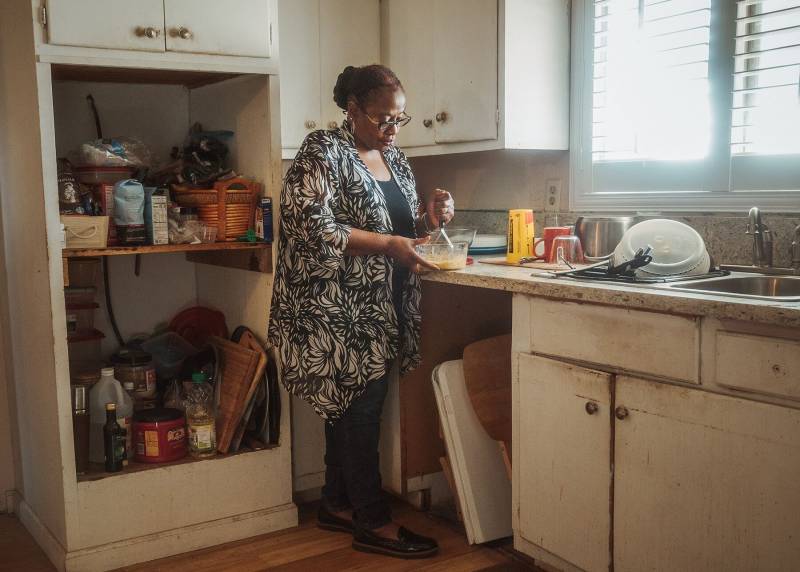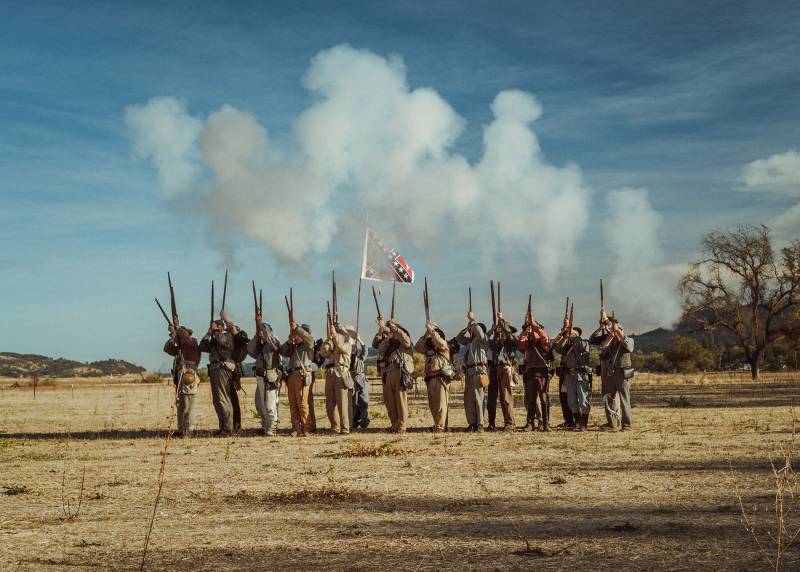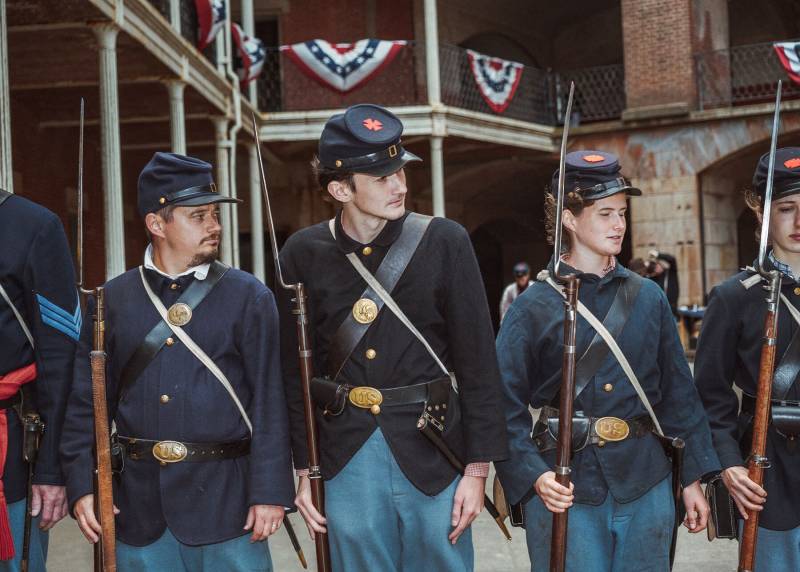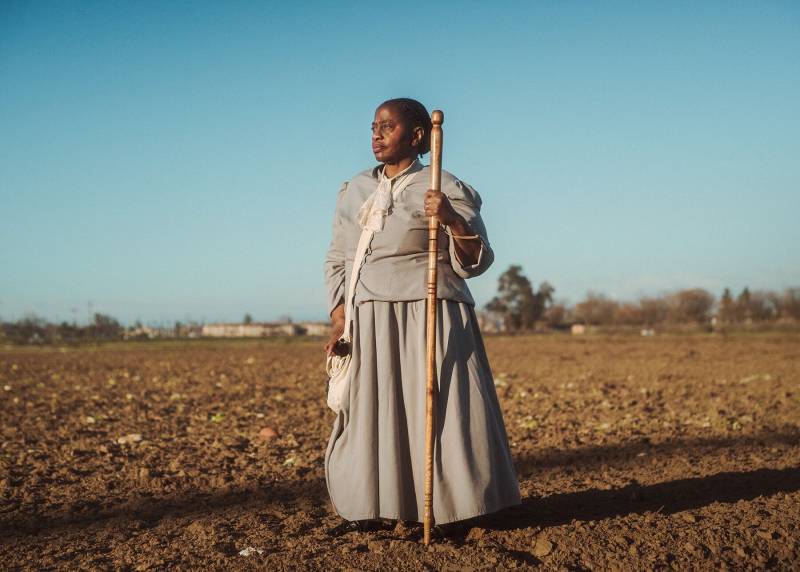I’m one of many lifelong students of Harriet Tubman University. I mean, she doesn’t have an actual college named in her honor, but why the hell not?
Tubman is one of the most important figures in the history of this country. She was enslaved, illiterate, and suffered from trauma—specifically brain damage, at the hands of her slave master. Despite that, she lived 90 years, full of achievements. She freed herself. She freed others. As a spy for the Union army, she was the first woman in U.S. history to lead a military expedition. She was buried with military honors.

The concept behind Tubman University is all about finding freedom for oneself, and then assisting others. It’s a philosophy many ascribe to. Some even rock sweatshirts that bear the name; evidence that I’m far from the only student in this school of thought.
At the head of this class is Nancy Whittle. She’s played the role of Harriet Tubman in Civil War reenactments throughout California for the past 30 years. I found out about her through Brandon Tauszik, a friend and photographer, who showed me some images from his upcoming exhibit.
The photo of Whittle caught my eye. That stern face, the outfit from the antebellum era, a woman holding a walking stick that looks like the one Moses used. I thought: Who is she?
The answer is that Nancy Whittle is a medical social worker, who lives in Fresno, California. And, sometimes, she’s Harriet Tubman.
She’s one of the few African Americans who participate in Civil War reenactments; sometimes flanked by reenactors playing the roles of Elizabeth Keckley (seamstress, author and assistant to First Lady Mary Todd Lincoln) and Sojourner Truth (famed abolitionist, orator and activist). Elsewhere on the reenactment field, men often play the roles of African American soldiers and slaves.
But these reenactments, which have been going on for decades, seem to have slightly changed as of late. And while Whittle isn’t one to place blame, she does note that it started happening sometime around the election of America’s current president.

Whittle never planned on getting this deep into Civil War reenactments. She went to school to be a journalist, and always enjoyed history and museums. But then Rose Caglia, former president of the Fresno Historical Society, asked if she wanted to be someone in the Civil War.
She started out playing a slave, and fittingly, the next year she was Harriet Tubman.
Suddenly she found herself part of a huge community. “It’s grown so big that they have people from Ireland coming, from France, from Spain,” says Whittle of the reenactments, during a phone call. “I mean, American history… it’s almost like an addiction, actually.”
She’s done reenactments in churches and at grade schools, in parks and at Stanford University. A quick look at upcoming events for the National Civil War Association and the American Civil War Association shows that there are reenactments scheduled throughout the year, and all over California.
Whittle, who works with the aforementioned groups as well as the the newer Buffalo Soldier Mounted Calvary Unit, says people take the reenactments seriously. Some ride horseback and play the role of well-known generals. Others have smaller roles, but still know not to break character. “You can have up to 2,000 people participating—soldiers, women, kids, all of that,” says Whittle.
With that comes the financial investment: the uniforms, the guns and the coordination of the events. “It costs a lot of money to be in it… making sure your character comes alive, it’ll cost,” says Whittle, who says she sometimes receives stipends for reenactments, but for the most part does the work as a volunteer.

Whittle says her role is to mostly represent Tubman and tell her story. Others involved tell similar accounts of African Americans involved in the Civil War, including Mrs. Dabney, one of the first African American spies.
Children have had birthday parties on the reenactment field. And as volunteers get older, people die. (“One of the most popular and favored Lincolns died in the past two years,” says Whittle.)
Whittle says she enjoys it; not just the acting, but the sense of family. “The Confederate side, behind the scenes, because the soldiers like to cook—they’ll have a bakeoff and invite me,” says Whittle.
But as of late, Whittle says, “We noticed a change in the last—oh, I’d say, the last four years. Yeah, four years,” adding that “I think the political climate has a lot to do with it.”
She says there’s a different tone to some of the reenactments. “There are folks who say things that aren’t politically correct,” says Whittle, mentioning that it’s the 30- to 45–year-old group that gets “a little weird.”
She says that she’s even seen people selling confederate bumperstickers at the events. She’s had to fight to carry a gun from the 1800s, which is historically accurate for Tubman’s character. She’s also been cussed out after asking someone to not smoke at an event.
When asked if she checks them on their behavior, Whittle is stoic. “No,” she says, “I just use historical facts and stay in character.”

Whittle says Harriet Tubman isn’t some Walt Disney character. I agree. She’s more than that. She’s more than an image on the cover of debit card striking the ‘Wakanda Forever’ pose, more than a face rumored to be on the new $20 bill, and more than a character in a Hollywood movie.
Tubman was a force; a warrior who survived oppression and abuse. And, to this day, there are lessons to be absorbed from her tale.
“When I share about what Harriet Tubman went through, not only helping those slaves escape, but the whippings and the humiliation that she went through, and how she stuttered. It always amazes me how in schools, I have kids—young girls—who come up to me and share about the abuse they’re going through at home,” says Whittle.
Inspired by Whittle’s act, people share stories of neglect from their parents and how they got into gangs, Whittle says. “Even now her life affects people who have faced dire circumstances in their life, and they want to come out about it, but they need to know that there was somebody before them that did that. And that’s the goal: to empower people to think ‘just because I’m here now doesn’t mean I can’t go for my dreams.’”
With that in mind, Whittle says she tells young students to think about how much more they can do because they can read and write. “And you should see the little shoulders go back, and heads get lifted,” says Whittle. “That’s what it’s all about: empowering people who feel as though they’re second-class citizens. It doesn’t matter what their ethnicity is—I have so many stories, so many letters from school-aged children, teenagers, about how they felt empowered.”
When asked if she feels as if she’s channeling Tubman’s spirit, Whittle recalls her mom, who was from North Carolina, and the child of enslaved parents. Whittle says she learned the songs Harriet sang from her mom, “And I never stopped and asked how she learned that,” says Whittle.
“When I’m singing her songs, I feel like I’m not Nancy anymore—I’m really Harriet Tubman.”

Photographer Brandon Tauszik’s exhibition ‘Pale Blue Dress’ opens Thursday, March 5, at the Book & Job Gallery in San Francisco. Details here.


